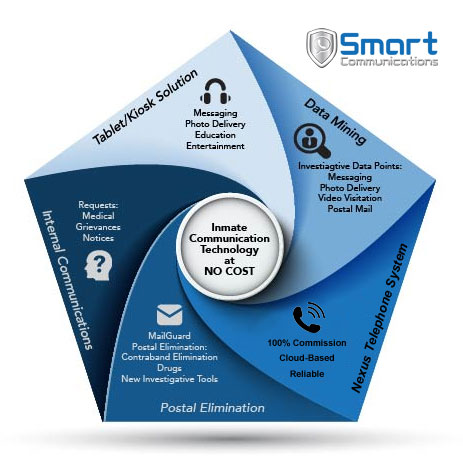Smart Communications – another prison profiteer

Smart Communications logo
Many do not realize that the mail one sends to an incarcerated loved one in Pennsylvania must now be sent to Smart Communications in St. Petersburg, Fla. There the mail is scanned, then sent digitally to prisons in the state, where copies are printed and distributed to recipients. The originals are kept for 45 days. Incarcerated people never receive the actual mail their loved ones sent.
How and why did this happen?
On Aug. 29, 2018, Pennsylvania Corrections Secretary John Wetzel ordered a lockdown of all state facilities after correctional officials allegedly got sick from substances in incoming mail. It didn’t matter that this highly suspect story was disproven by many. Plus, it is well-known that guards are the major source of drugs in prisons.
Yet based on these fabricated accounts, the Pennsylvania Department of Corrections contacted Jon Logan, owner and CEO of Smart Communications Holding, Inc. And on Sept. 4, 2018, in a no-bid, 3-year contract, the PA DOC executed an emergency agreement with Smart Communications to scan and process prisoners’ postal mail for $15.8 million. (tinyurl.com/3dvv9p3d)
It is highly suspect that a company could be found and a plan could be implemented in six days; so, was this already planned? “They were the only company that could do it as quickly,” Wetzel claimed.
We see this contract for what it truly is — yet another way to completely privatize every facet of an incarcerated person’s life. It extracts any human emotion (like getting a real drawing from your child instead of a copy) from the daily lives of the incarcerated.
It leaves feelings of simmering rage and despair. This is one of the reasons why there are so many angry and rebellious incarcerated people. The prison administrations’ solution is to implement yet more and more retaliations and punishments.
This contract is paid for with tax dollars, leeching money from the families of the incarcerated. In frustration, many incarcerated people in Pennsylvania started to use email to communicate, even though it costs 25 cents a shot. However in order to use email, the incarcerated person (or their family) must purchase an electronic tablet at a grossly inflated price from the prison commissary.
Smart Communications also offers the potential for deep surveillance. In March 2018, the company pitched a proposal for their Mailguard system to the Virginia DOC. It stated: “Investigators will have access to the postal mail sender’s email address, physical address, IP address, mobile cell number, GEO GPS location tracking, exact devices used when accessing system, any related accounts the sender may also make or use,” Fortunately their proposal was rejected. (thevice.com, March 24)
The renewal of this Smart Communications contract is in September, and Food Not Bombs Solidarity, along with incarcerated member Jerome Coffey, plans another demonstration to expose and protest the privatization schemes of the Prison Profiteers.

